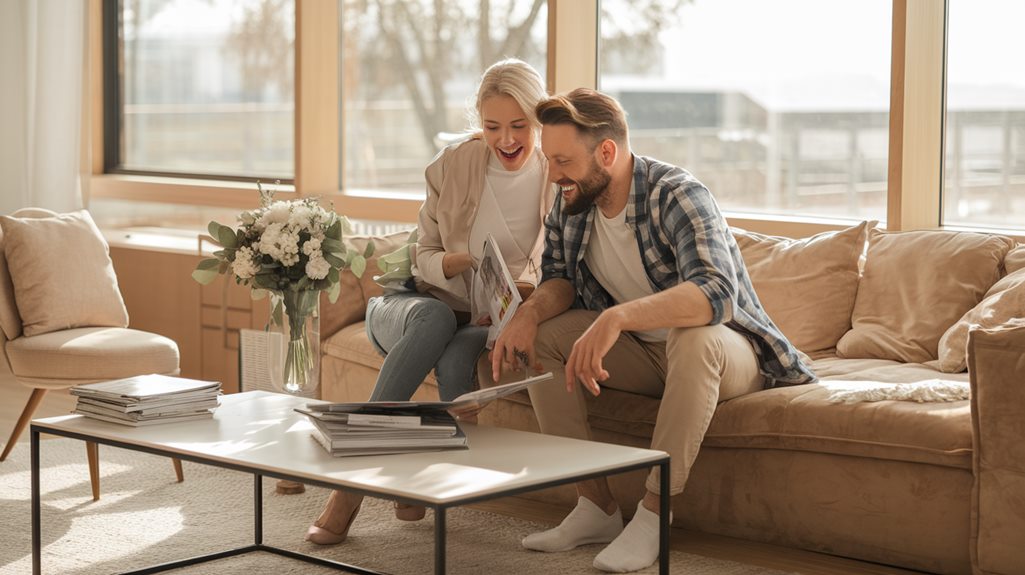Buying a home is a big step! First, check your money situation. Look at your credit score and how much you owe. Make a budget so you know what you can spend and how much you can put down for a house.
Next, look at different mortgages. Compare interest rates and types of loans to find one that works for you. It's a good idea to get pre-approved for a mortgage. This helps when you make an offer on a home.
Then, research neighborhoods. Think about what you need, like parks and schools. A real estate agent can help you find the right place.
Go to open houses to see homes in person. When you find one you like, make a smart offer. Don't forget to get a home inspection. This will help you find any hidden problems with the house.
Finally, work with your agent to check the closing costs. This will help you understand what you need to pay to finish the deal.
Happy house hunting!
Ready to start building equity in your own Michigan home? Get your personalized home loan quote today.
Assess Your Financial Health

Before you start looking for a home, it's very important to check how healthy your money situation is. First, look at your credit score. This number can help you get a loan and decide what interest rates you might pay.
Next, make sure to manage any debts you have, especially the ones with high interest. Try to pay those off first.
You should also save money for things like a down payment and closing costs. Make a plan for your savings that fits your goals.
Take a close look at how much money you earn and think about your job future. Use simple budgeting tools to track your spending. This can help you see where you can save more money.
Michigan residents, unlock the door to your new home. Request your home loan quote from Treeside Financial today.
Determine Your Budget
To figure out your budget, take a good look at your money.
Check how much you earn, what you spend, and what you owe.
Think about how much you can put down to buy a home. If you can save a little more for the down payment, your monthly payments could be lower.
Assess Financial Health
Knowing how healthy your money is helps you see how much house you can really buy. First, look at your credit score. This number shows if banks will lend you money.
Next, save some money to help you buy a home. It's also important to manage your debt well and have a steady job. This way, you can get better loan offers.
Don't forget to keep an emergency fund. Life can be surprising, and you want to stay on track with your money goals.
Track your spending too, so you don't miss any hidden costs that could change your budget.
Calculate Down Payment
When you think about buying a home, it's important to know how much money you have. This helps you see if you're ready.
After that, you need to figure out how much money you can put down as a down payment. A down payment is the money you pay upfront when you buy a house. A good goal is to save 20% of the house price. This can help you avoid extra fees called private mortgage insurance.
But don't worry! Many banks let you buy a house with less money down, which is great if you want to move into your new home soon.
To save money, you can make a plan. Try to set up automatic transfers to a special savings account. This way, your savings can grow little by little.
Explore Mortgage Options

When you're looking for a mortgage, it's important to check the interest rates from different banks. This helps you find the best deal.
There are different kinds of loans, like fixed-rate and adjustable-rate mortgages. Knowing about these loans will help you pick the one that works best for you and your money.
Compare Interest Rates
Finding the best mortgage deal is like a treasure hunt! Start by looking at interest rates from different banks. This will help you see what's out there and make you feel good about your choices.
Watch how interest rates change, because they can go up and down, which affects how much you'll pay in the long run.
You can use special tools called mortgage rate calculators to guess how much your payments will be. This can help you plan your budget and make sure it fits your life.
Remember, even a small change in interest rates can mean a lot of money over time!
Talking to different lenders gives you more options. It's like having many paths to choose from to find the best rate for your money goals.
Loan Types Explained
Now that you've looked at interest rates, let's talk about the different types of loans you can choose from. Picking the right mortgage can make buying a home easier. Here are some options:
- Conventional Loans: These are good for people with strong credit. They come with fixed or adjustable rates and different loan terms.
- FHA Loans: Great for first-time buyers! They need a smaller down payment and have easier credit requirements.
- VA Loans: These loans are for veterans and active-duty service members. You don't need a down payment, and the interest rates are good.
- USDA Loans: These are for people buying homes in rural areas. They've low-interest rates and don't need a down payment.
If you want to buy a bigger home, you might need a jumbo loan.
And don't forget, you can also look into refinancing later to change your loan terms. Knowing about these options can help you feel more sure and happy when buying your home.
Get Pre-Approved for a Loan
Getting a loan pre-approved is a big step when you want to buy a home. It shows sellers that you're serious about buying and helps you stand out.
First, check your credit score. This score affects what kind of loan you can get and how much interest you'll pay. A good score can help you get better rates, which means you'll save money later on.
Next, talk to a lender. They'll help you understand your finances and look at different loan options. They'll check your income, debt, and what you own to see how much money you can borrow.
This helps you know your budget and makes you a stronger buyer in the housing market.
Research Neighborhoods

When you're looking for a new home, it's important to think about the things nearby. Check out parks, stores, and how easy it's to get around. These things should fit what you and your family like to do.
Also, look at the schools in the area. Good schools can help your kids and can make your house worth more later.
Assess Local Amenities
Looking at local amenities is very important when you're buying a home. These things can help make your life better and keep your home's value high. Here are some things to think about:
- Parks and Fun Places: Check if there are parks and places to play nearby. Having these spots can help you enjoy the outdoors and have fun.
- Safety and Help: Find out how safe the area is and what services are available. You want to feel safe and know help is close by.
- Getting Around and Shopping: Look at how easy it's to get to places and if there are stores nearby. This can help you enjoy life more.
- Eating Out and Fun Activities: See what restaurants and fun things to do are in the area. These can make you feel at home and make your days more enjoyable.
Evaluate School Quality
When looking for a good place to live, checking out schools is super important for families. First, you can look at school ratings and what parents say about them. This helps you see how good the schools are.
Next, think about the fun activities and learning resources the schools have. These can make school a lot more exciting for your child!
You should also look at test scores to see how well kids are doing in school. It's good to know who the students are, too, so you get the whole picture.
Don't forget to check if the school is a safe place and if the community is involved. This shows how happy and caring the environment is.
If there are colleges nearby, that can be a bonus! It gives kids even more chances to learn.
Choose a Real Estate Agent
Choosing the right real estate agent is super important when you're buying a home. Here are some simple tips to help you find the right one:
- Check Their Skills: Make sure the agent has the right licenses and knows your area well.
- Know the Market: Pick someone who understands the local market and can help you get a good deal.
- Talk to Them: Find an agent who talks in a way you like. It's important to have clear and friendly conversations.
- Read Reviews: Look at what other people say about the agent. Happy clients are a good sign!
Also, think about how available they're and what their fees are.
You want someone who fits your budget and schedule. With the right agent, you'll feel good and confident as you search for your new home!
Start House Hunting

House hunting can be exciting and a little tricky. It's like a fun adventure where you need to pay attention to details.
First, think about where you want to live. Look for places that match what you like and what's important to you. Check if there are good schools nearby, parks to play in, and fun things to do in the community.
Next, look at homes online. There are many websites where you can see houses for sale. You can search for homes by how much they cost, how big they are, and where they're located.
Make a list of what you want in a house, but also be open to new ideas as you find different options.
Don't forget to work with a real estate agent. They can help you learn more about different homes and might know about some that aren't listed yet.
Attend Open Houses
Looking for a new home can be exciting! One great way to see houses is by going to open houses. This helps you get a good look at different homes.
Here are four simple tips to make your visits better:
- Be On Time: Arriving when the open house starts shows respect to the host and other visitors.
- Ask Questions: Don't be shy! Ask about the house and the neighborhood. This helps you learn more.
- Take Notes: Write down what you see and like. This makes it easier to remember each place later.
- Check Online Tours: If you can't go in person, look for virtual tours online. They can give you a good idea of the home.
Enjoy your house hunting adventure!
Make an Offer

Making an offer on a house is a big step in buying one. It's important to think carefully and know what the market is like. First, you need to come up with a good offer that fits your budget and the value of the house.
Look at similar houses that have sold nearby to make sure your offer is fair and competitive. Working with your real estate agent is really important. They can help you understand the market and give you good advice.
When it's time to negotiate, be ready to act fast and with confidence. Show that you really want the house, but try not to tell the seller how much money you can spend at most.
This way, you can build trust with the seller and show them you're serious about buying. Remember, you want both you and the seller to feel happy with the deal!
Conduct Home Inspection
After you make an offer on a house, the next step is to have a home inspection. This is super important! It helps you make sure you're buying a good home and feel happy with your choice.
Start by making a home inspection checklist. Look for these common things:
- Strong Structure: Check the foundation, roof, and walls. Look for cracks or any damage.
- Plumbing: See if there are any leaks. Check how strong the water pressure is and how the pipes and faucets look.
- Electricity: Make sure the wiring is safe. Look at the outlets, switches, and the circuit box.
- Heating and Cooling: Test how well the heating and air conditioning work.
When you pay attention to these details, it helps you feel safe and happy in your new home.
Close the Deal

Closing the deal on your new home is super exciting! It means you're almost done with your home-buying adventure.
Now, it's time to make sure you get the best deal. Look closely at the closing costs. These are the extra fees you may need to pay, like for appraisals, inspections, and taxes. Check if you can negotiate some of these costs. You want to feel good about every dollar you spend.
Talk to your real estate agent. They know a lot about buying homes and can help you with the last steps.
Remember, this is your new home and a big investment. As you sign the papers and finish the purchase, think about how you're becoming a part of a new community.
With careful planning, the keys to your dream home are very close!







